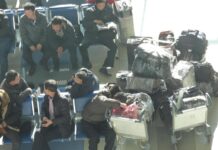Kim, the Chongjin-based student who talked with the Daily NK at length about the ”150-Day Battle,” this time explains how the Battle caused considerable damage.
He explains how the authorities just handed down decrees stating production targets for each factory, without offering any way for the factory to reach its numbers.
– Are enterprises also dissatisfied with the “150-Day Battle?”
As crop damage worsened in the summer, the North Korean authorities issued a decree to factories and enterprise offices requiring them to provide a liquid made from boiled wormwood and willow leaves as a replacement insecticide.
Enterprises agreed to deliver the liquid to farms. In other cases, farmers were given money with which to make the insecticide themselves.
But the “insecticide” which arrived at farms was largely ineffective due to the fact that the people who produced it mixed the leaves indiscriminately. Isn’t a person who tries to farm successfully this way an idiot? Will the insects really die off?
In some sectors, enterprises are being provided with resources and production is going well, but the majority have been forced to produce ad-hoc and without materials. Further, hurriedly manufacturing with materials brought in from China, which are more expensive, has led to higher prices and lower quality.
The fact that power plants are functioning well and the ingredients for cement are being provided is a good thing, and so is resuming production by purchasing resources from China. The state is responsible for thinking of ways to revive factories and enterprises, rather than unconditionally forcing them to produce materials and commodities off their own bats.
North Korea has used politics not to help its people to survive, but to sustain its political system. The North Korean regime continually makes policy decisions that generate grievances in the people; if this is not a ludicrous form of adventurism, then what is?
– If the state does not provide any resources, must a factory or enterprise office continue to operate?
In North Korean society, there is no alternative. Going against the General (Kim Jong Il)’s struggle to build a strong and prosperous state is not only against his decrees, but also a serious breach of the political rules.
If the North Korean regime requires something, then no one can refuse. If anyone does refuse, then they are labeled a counter-revolutionary.
– Can Chosun (North Korea) build a “strong and prosperous nation” by 2012?
North Korean government propaganda claims that a “strong and prosperous Socialist state” must be built under any circumstances by 2012. We have sufficient strength and ability to achieve this, they say.
However, the “150-Day Battle” not only demonstrated that the North Korean state has neither the strength nor ability to construct a “strong and prosperous” state, but clearly showed that, if they are recklessly driven to construction, the citizens will be the ones who suffer.
Due to its risky and unbalanced economic policy, the “150-Day Battle” has only lessened the morale of the citizens long-term.
– What do you think are the exact causes of public demoralization?
First, the harvest was destroyed this year. Because it is inevitable that suffering will follow, people have less hope. Even if goods are available in state-operated stores and electricity is provided for an additional hour a day, the world will not change.
Because each factory and enterprise office was urged to produce at all costs, unthinkable events have occurred, such as low-quality goods being sold at significantly higher prices in the jangmadang, despite their obviously being a waste of money.
The example of the North Hamkyung Province Trade Maintenance Office is telling.
In response to the provincial party’s decree to gather whatever materials were needed to help sustain local factories and enterprises, the North Hamkyung Province Trade Maintenance Office bit the bullet and said it would bring in fabric and cloth from China. They made contracts with Chinese traders to barter with clam, hairy crab, eel and other marine products.
The Chongjin Clothing Factory and the Chongjin Manufacturing Factory subsequently made short-sleeved shirts and other things to sell in the shops. But due to the expensive price of those goods, they ended up inevitably being sold at higher prices than similar products in the jangmadang.
Think about it. One would rather go to the jangmadang and bargain for Chinese clothing than pay more for lower quality products.
Ultimately, the price of the clothing went down and it was exchanged for clam and sea urchin eggs with the Fisheries Department, but due to the high prices and the disappointing harvest, the damage was significant and the Trade Maintenance Office has apparently been in chaos as a result.
The products being sold in state-operated stores are more expensive than in the jangmadang for this reason, instilling in the minds of the citizens the idea that not a whiff of socialism remains today.
The situation got so bad that people scorn those working in state-run stores, saying, “They must be constructing a strong capitalist nation, not a socialist one.”
In the light of all this, the North Korean authorities’ continuously claiming the success of the 150-Day Battle seems rather ironic.




















